CHARLOTTE, N.C. — Charlotte city leaders wrapped up day two of their annual strategy meeting in Winston-Salem.
During the strategy meeting, city leaders looked back at past successes, including programs that have worked and set the strategic direction for the year ahead.
The goal of this conference is really about city leaders and Charlotte City Council members coming together with plans on how to improve the daily lives of those who live, work and play in Charlotte.
“We know in this community people want our city to be safe, we also want our city to be vibrant and able to move around for work, we want economic development,” Charlotte Mayor Vi Lyles said. “This is the day to talk about not just the what, but the how, and move forward with that.”
They focused on topics like improving infrastructure, expanding workforce development, and affordable housing.
Part of the affordable housing conversation focused on increasing anti-displacement initiatives, creating more paths towards homeownership, and expanding outreach so more people know about these programs.
RELATED: East Charlotte apartments to be first dedicated housing for homeless veterans in Mecklenburg County
There were also a lot of conversations surrounding increasing investments in small businesses, arts and culture, and essentially building stronger communities.
A big part of that plan is the Corridors of Opportunity program. The city works with community leaders and nonprofits to focus on restoring and uplifting six historically underinvested areas of Charlotte.
City leaders celebrate successes each corridor accomplished in 2023, like securing money for pedestrian safety improvements and the Three Sisters Market.
Community organizer Sharika Comfort told WCNC Charlotte the market will be the first grocery store in the West Boulevard area in 30 years. Comfort is happy the corridor also launched its own merchants' association.
"The merchants association was a way to connect with business owners, most of whom were residents in the area, as well and identify what their needs were," Comfort explained.
Plus, Mayor Pro Tem Dante Anderson was proud of the Economy Inn being torn down and converting other Sugar Creek motels into housing opportunities.
"Constituents are having very visceral reactions to what we’re doing in the Sugar Creek corridor, so I wanna say kudos," Anderson said.
Looking ahead, Councilwoman Dimple Ajmera wants the program to identify resources for available and affordable childcare in the corridors.
"If a mother cannot-- doesn’t have childcare services, they can’t attend workforce training opportunity, or other small business, or entrepreneurship sessions," Ajmera said.
Comfort and many leaders noted it's important to continue to invest in the program in the annual city budget. "The investment has to match the underinvestment," Comfort said.
In 2024, the Corridors of Opportunity program will expand its e-bike pilot program and launch business opportunity hubs in each corridor.
The city's regional mobility plan was also a priority discussed.
Charlotte city leaders have a goal to move more people around and give them more options and ways to do so, but meeting these goals comes down to getting the funding to make it happen.
“Providing more ways to move, that is transit, that’s biking, that is pedestrians, but we can also think about in less time," Special Assistant to the City Manager for Mobility Ed McKinney said. "How do we reduce the time, the distance, the costs?”
The city’s Strategic Mobility Plan is about planning for future growth and dealing with congestion as more people move to Charlotte and make the city their home.
“We looked at the need and we also looked at what our aspirations are, where are our bikes system's going,” McKinney said. “Where is CATS going with bus priority systems and mobility hubs and micro-mobility strategies they have.”
Transportation leaders said a good system means investments in several sectors so everyone has access to a good-paying job, a safe place to live and a way to get there.
“Our job from a mobility standpoint is to make it as seamless as possible,” McKinney said.
Transportation leaders from other cities were at the meeting to share more on funding sources that could help get the wheels moving in Charlotte.
“What we have really done in Denver, which I think is certainly an opportunity in Charlotte, is leverage OPM,” Infrastructure Strategies CEO Adam Phipps from Denver said. “Leveraging other people’s money. Whether that is private investment, you can certainly leverage that from a development standpoint when you are a growing city, but there is also an opportunity that I have not heard mentioned yet and that we didn’t have when we first started and that’s the bipartisan infrastructure law."
Building safer communities and reducing crime were also part of the dialogue.
CMPD Chief Johnny Jennings attended the meeting, shared some public safety stats and spoke more about the the spike in crimes involving juveniles. Jennings said creating an outlet for the youth and programs to help kids on the wrong path get back on track are a priority for the department.
The multiday conference ends on Wednesday.
Contact Jesse Pierre at jpierrepet@wcnc.com or follow her on Facebook, X and Instagram.
Contact Julia Kauffman at jkauffman@wcnc.com and follow her on Facebook, X and Instagram.


